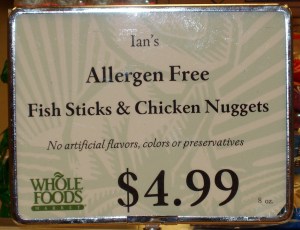Saw this sign on a display in Whole Foods the other day:

Okaay… but what if you’re allergic to fish?
Saw this sign on a display in Whole Foods the other day:

Okaay… but what if you’re allergic to fish?
Time to add an “outrage” category. This is just insane: A church panel has invalidated a girl’s communion because she can’t eat wheat (original article here).
The girl has celiac disease, which means any amount of wheat can cause her serious health problems. A local priest was willing to let her use a rice-based wafer, but higher-ups declared it was invalid — that if there wasn’t wheat, it didn’t count. She can either take the communion with a wheat-based wafer, or not take it at all.
For all intents and purposes they’ve excommunicated this girl because of a medical condition.
Good thing I’m not Catholic and the sacrament doesn’t involve peanuts.
I wonder if the church would be willing to pay for emergency room visits (or funerals) resulting from this kind of situation?
Congress has passed passed the Food Allergen Labeling and Consumer Protection Act, mandating the top 8 food allergens appear on labels in plain English! The voluntary labeling over the past few years has been very helpful. Well, some of it has — the “processed in a facility that also processes XYZ” labels mainly amount to a CYA statement, although I’m sure there are people sensitive enough that it does help.
The NPR story provided some examples of why this matters, including a story of a college student who had a very similar experience to one I had a few years ago: he bought a chocolate chip cookie from a vending machine — a brand he had been eating with no problems for several years — but they had added peanut flour to their mix without labeling the change. He died within 15 minutes. When it happened to me, I had enough medication to stop it. But I don’t eat anything from Famous Amos anymore.
Some other nice provisions include having the FDA do a study on cross-contamination [archive.org], and having the CDC track allergy-related deaths.
Further reading: The Food Allergy and Anaphylaxis Network, The Food Allergy Initiative. [Update: The organizations have since merged as FARE.]
Here’s another interesting Food Allergy Alert:
Wisconsin Cheesecake Co., Inc., is recalling 28-oz. Candy Bar Cheesecakes containing either Butterfinger, Reese’s Pieces, Peanut Butter Cup, or Snickers brands because they contain undeclared peanuts.
Now I’m not sure what’s stranger about this: the fact that someone managed to leave peanuts off the ingredients list, or that they think a recall is necessary in this case. Anyone with a peanut allergy has long since learned to avoid anything that says “Snickers” or “Reese’s.” Heck, I still have to think twice to remind myself I can eat snickerdoodles. If I see a Butterfinger cheesecake, I don’t need to look at the ingredients. I already know it’s not safe.
Eh, maybe it’s to counteract all those “well-meaning” adults who don’t believe in allergies and insist, “Oh, just one bite won’t hurt you!” — and then watch in horror as the three-year-old who was left in their charge is rushed to the emergency room. I can just imagine someone like that saying, “Oh, well, it says Snickers, but it doesn’t say it has peanuts, so it must be safe for him.”
Excerpt from a recent Food Allergy Alert:
Sunny Lake Trading, Inc. is recalling 10-oz. plastic bags of “Candy” because they contain undeclared peanuts.
Gotta love their marketing scheme. “I’d like to buy some candy, please.”
It reminds me of those long-distance phone companies with names like “The Cheapest One.”